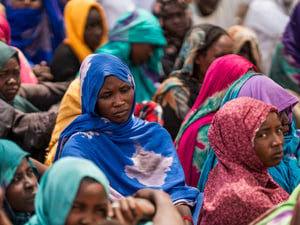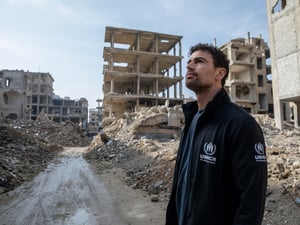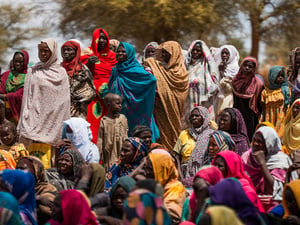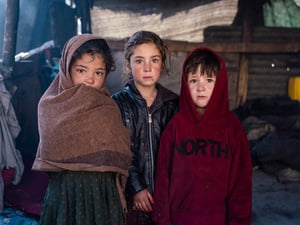Ministerial coordination meeting of major host countries for Syrian refugees in Jordan
Ministerial coordination meeting of major host countries for Syrian refugees in Jordan
Government ministers from Iraq, Jordan, Lebanon, Turkey and Egypt together with UNHCR met today to appeal for significantly heightened efforts to address the growing human impact of the Syria crisis.
The high-level meeting was co-chaired by H.E Mr. Nasser Judeh, Minister for Foreign Affairs of the Hashemite Kingdom of Jordan and the UN High Commissioner for Refugees, António Guterres, who were joined by H.E Mr. Hoshyar Zebari, Minister for Foreign Affairs of the Republic of Iraq; H.E Mr. Rashid Derbas, Minister for Social Affairs of the Lebanese Republic and H.E Mr. Ahmet Davutoğlu, Minister for Foreign Affairs of the Republic of Turkey and H.E Hamdi Loza, Deputy Minister for Foreign Affairs of the Arab Republic of Egypt as part of a high-level regional coordination effort between UNHCR and major refugee-hosting countries in response to the largest refugee outflow in nearly 20 years.
The Ministers and the High Commissioner for Refugees recognized that Syria has become the largest crisis of forcible displacement in the world, and that this is posing a growing threat to regional peace and security. They noted that the burden of hosting Syrian refugees has been disproportionately shouldered by the five host countries, and that many host communities have seen their own resources stretched to a breaking point.
The Ministers and the High Commissioner for Refugees reaffirmed the outcomes of a high-level meeting that took place in Turkey on 17 January at Şanlıurfa Harran Kökenli Camp in Turkey and the conference on solidarity and burden-sharing with countries hosting Syrian refugees, which took place during UNHCR's Executive Committee session in early October 2013.
The Ministers and the High Commissioner for Refugees reiterated the imperative for much higher levels of international solidarity and burden sharing to the more than 2.7 million Syrian refugees in the region and their host communities. They noted the continued need for massive international support, including increased bilateral support and financial and development assistance to help hosting countries cope with the escalating demands placed on national services and infrastructure as a result of the refugee influx. They also appealed to development actors and financial institutions to scale up their support to refugee hosting countries.
The Ministers and the High Commissioner for Refugees based on the principle of solidarity and burden sharing urged all other countries outside the region to keep their borders open for Syrians seeking protection and to facilitate their legal access to their territories. In this regard, they also called on these countries to offer more flexible visa regimes, open family reunification procedures and expanded resettlement and humanitarian admission programmes.
The Ministers and the High Commissioner for Refugees recalled the unacceptable and continued cost of war to civilians, and mourn the profound loss suffered by the Syrian people. They recalled Security Council resolution 2139 (2014), and called for its immediate and full implementation to assure the safe and unhindered delivery of humanitarian assistance to the more than nine million people who need help.
The Ministers and the High Commissioner for Refugees called for greater assistance inside Syria and underlined the need to create an environment conducive to the safe and dignified return of Syrians.
The Ministers and the High Commissioner for Refugees stressed that there is no humanitarian solution to this political crisis, and underlined the need for a political solution to end the human suffering, emphasizing that there can be no military solution to the crisis in Syria.
They declared that, in the absence of a political solution, the only outcome of this continued conflict is further suffering of the Syrian people and that it is morally and politically imperative that the international community overcomes its differences and unites to put a stop to the bloodshed.
The Ministers and the High Commissioner for Refugees agreed that the protracted nature of the crisis in Syria necessitates the formulation of new and innovative approaches to address the ever-increasing challenges faced by host countries.
The Ministers and the High Commissioner for Refugees noted that the 2014 Regional Response Plan appeal is only 25% funded and urged donor countries to continue their support as the situation worsens. The US $1 billion of funding received so far has helped enable hosting countries, UNHCR and its partners to provide life-saving assistance to millions of people. They noted that the direct financial support requested for the host countries under the appeal was also underfunded.
They urged donors to fulfill pledges made at the second International Humanitarian Pledging Conference for Syria held in Kuwait in January this year and to strongly support governments directly and their different national resilience and development plans put in place to respond to the dramatic impact of the Syria crisis on the economies and societies of neighboring States.
They expressed their gratitude to Hashemite Kingdom of Jordan for hosting this meeting and welcomed the offer by the Republic of Lebanon to host the next meeting. They declared their solidarity and support to the government of Lebanon during these exceptional times. They also expressed the need to implement programmes aimed at supporting host communities in Lebanon, Jordan.
For more information please contact:
- Melissa Fleming, in Jordan on mission, on mobile +41 79 557 9122
- Hélène Daubelcour, in Jordan, on mobile +962 79 889 1307








